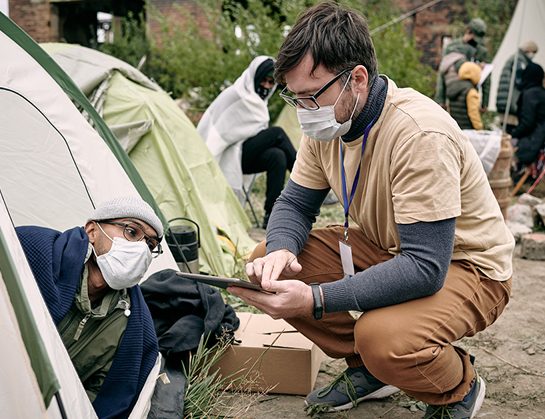The refugee resettlement process in the US features a myriad of moving parts. Multiple agencies and organizations are often involved in a single refugee case, with social workers serving as key players in the process. Social workers are equipped with the skills needed to tackle the unique challenges of refugee/immigration policies.
From a broad perspective, social workers are responsible for the basic needs of refugees, making sure they have food, water, shelter, etc. However, in addition to ensuring the physical needs of refugees are met, social workers also play an essential role in immigrant and refugee communities by reporting issues such as employer exploitation, domestic violence, sex crimes, and child abuse to social service and law enforcement agencies. They act as mediators for individuals who are hesitant to report offenses due to fear of deportation. Finally, as advocates, social workers play a role in standing up for immigrants who are the victims of anti-immigrant policies and discriminatory practices.
A primary focus of social work for immigrants and refugees is the identification and management of the social and emotional issues inherent in adapting to resettlement. The tools necessary for helping immigrants and refugees nationally also provides a good foundation for social workers to help refugees abroad. They become qualified for international humanitarian work in under-served and high-need villages and countries.
Social workers have the unique opportunity to serve as allies to those seeking safety and asylum. From basic physical needs to legal protection, social workers are able to assist in these unique and challenging transitions. These efforts, however, are met with added difficulty when combined with every other moving part of the refugee resettlement process. While social workers are able to assist in many areas of resettlement, this does not eliminate the involvement of others. Subsequently, maintaining communication and collaboration becomes essential to the refugee resettlement process.
Care coordination platforms, such as ClientTrack© by EccoVia Solutions, can help social workers and their organizations harmonize all the different moving parts and better provide these essential services by making sure that all the necessary information is captured and shared with the necessary people. With ClientTrack, social workers can more easily help individuals and families seeking refuge by providing a single platform from which refugee information can be entered, individuals or families can be referred to essential services, outcomes can be tracked, and the time-consuming work of reporting can be largely streamlined.
To learn more about ClientTrack’s Refugee Resettlement tools, schedule a demo here.
Sources:
https://www.theguardian.com/social-care-network/2016/mar/15/social-work-refugee-crisis
https://www.ssa.uchicago.edu/social-workers-and-protection-immigrant-and-refugee-rights



